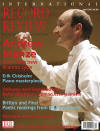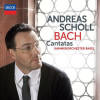Texte paru dans: / Appeared in:
*

International Record Review - (04/2012)
Pour
s'abonner / Subscription information
Decca
4782733

0028947827337
Consultez toutes les évaluations recensées pour ce cd
~~~~ Reach all the evaluations located for this CD
Purity and delicacy are the hallmarks of these unwaveringly delightful performances of two Bach cantatas and individual numbers taken from four others. The poised and graceful delivery which are the hallmarks of Andreas Scholl’s performances are here in full measure, and he is supported by some outstanding playing from the Basel Chamber Orchestra led by Julia Schröder, who sets off the uncredited organist in a deliciously buoyant Sinfonia to Cantata BWV169, all of which is nicely carried in a splendid recording. Decca has done Scholl proud.
Bach has obviously been dear to Scholl’s
heart since childhood and in his very personal
booklet notes he recalls how, as a nine-year old boy chorister, he fell in
love with the St John Passion; ‘Is it possible for children to completely
fathom all aspects of those compositions?’ That question leads into a
lengthy discussion on the intellectual approach to Bach, which reveals
Scholl, great countertenor superstar as he is, as a humble , genuine and
sincere musician who holds Bach in something approaching awe; ‘I was almost
in tears wanting to quit, thinking, I am not good enough for this Bach.’
However, we do not need to read this, deeply affecting as Scholl’s words are, to know that Bach holds a special place in his artistic psyche, for these are intensely perceptive performances, which, wrapped up in considerable aural charms, nevertheless reach into the very soul of the music. Moments of great perception are frequent and, coupled with the sheer beauty of his matchless voice, they come across with considerable impact.
With the first recitative and aria from Gott soll allein mein Herze haben (BWV1 69) he manages to convey a mixture of prayerful introspection, heartfelt joy and restrained passion which interpret both the text and the music with unerring directness . His impeccable precision in pitch and articulation is nowhere more vividly revealed than in the harmonically wayward aria ‘Stirb in mir, Welt ist die Liebe Gottes?’, where, once again, that unnamed organist performs wonders with a remarkably fluid right hand. For the closing chorale of this cantata, Scholl calls in three solo voices to provide the chorus parts — Junko Takamaya, Michael Feyfar and Raitis Grigalis. It may be just a fleeting appearance - the entire track lasts just 1’3” - but it is a moment of pure magic as these four voices subjugate their individuality for a blended tone of rare subtlety.
Originally conceived for a bass voice, which is how most of us know it, Ich habe genung (BWV82) when sung by a countertenor takes on a wholly different demeanour. While occasionally the tessitura seems a little out of Scholl’s comfort zone — there’s a very ugly low note in the final aria ‘Ich freue mich auf meinem Tod ‘ — this is an entirely convincing performance, which while it gives the work a lighter feel, loses none of its profound spiritual depth.
0f the four filler tracks, one is purely instrumental — the brief Sinfonia to BWV150
— while another, the aria Bekennen will ich seinen Namen, seems to have been included more to allow a pair of violins to intertwine gracefully above and between Scholl’s discreetly placed utterances than as a showcase for the voice. Similarly the short recitative from Komm, du susse Todesstunde (BWV161 ) is notable not for Scholl’s exquisite realization of the vocal line but for the enchanting, almost haunting sound of a pair of recorders fluttering away in the background. The little tinkling of a bell — the last sound we actually hear on the disc — adds something akin to musical stardust to ‘ Schlage doch, gewünschte Stunde ‘ , the aria from BWV53.
These are intensely satisfying
performances delivered with consummate artistry from not just a fabulous
singer but a remarkable group of instrumentalists too.
Fermer la fenêtre/Close window
Cliquez l'un ou l'autre
bouton pour découvrir bien d'autres critiques de CD
Click either button for many other reviews


